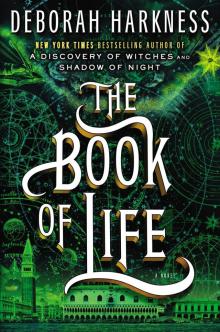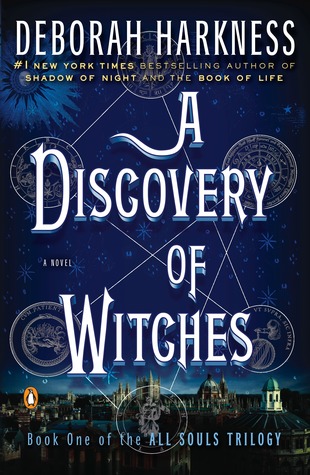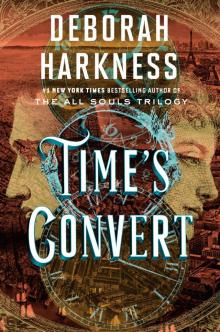- Home
- Deborah Harkness
Time's Convert Page 20
Time's Convert Read online
Page 20
—
MARCUS HAD THOUGHT NEVER to see Trenton again. He had nearly frozen to death there, waiting to cross the Delaware River with the rest of Washington’s troops during the dark days before Christmas when all had seemed lost.
Trenton was a very different place now where, with utmost secrecy and under direct orders from General Washington, Dr. Otto and his staff were inoculating the entire Continental army.
These days, Marcus’s pockets were filled with spools of thread and scalpels rather than ammunition and fuses. Dr. Otto had definite ideas about cleanliness, and the scalpels were boiled in a mixture of vinegar and soap each night. Once a piece of thread was used, it was put into a shallow basin, the contents tossed into the stoves and burned at the end of each day. To keep their clothes from harboring the infection, all of the soldiers were stripped naked and wrapped in blankets. Mrs. Dolly, that indispensable member of Dr. Otto’s staff, had come to Trenton along with all three of Otto’s sons, his medicine chest, and the laundress’s seemingly bottomless iron cauldrons. It was she who had the job of washing the threadbare clothes and (if possible) returning them to the soldiers once they recovered from the pox.
The Trenton barracks housed men from every part of the colonies, all of them undergoing some form of treatment. Southerners with their soft drawls were bedded down next to fast-talking New Yorkers and long-voweled New Englanders. Marcus heard many a soldier’s story on those long nights when he was cleaning up after the men. Some were younger than fifteen and had signed up for service in place of an older man who didn’t want to go to war. Some were hardened veterans who told harrowing tales of their previous service to while away the hours of confinement as they waited for the pox to take hold.
All of the men—young and old, Southerner and New Englander alike—were anxious about inoculation. Dr. Otto was a good teacher, and patiently explained the process and why General Washington had ordered that the whole army undergo the procedure.
These explanations might have been medically sound, but they did little to ease the soldiers’ minds. As the smallpox spread, fear grew alongside it. While many of the Continental soldiers knew of at least one person who had undergone inoculation and survived, most also knew someone who hadn’t been so fortunate. Dr. Otto kept careful records of the soldiers he inoculated, noting how the fever progressed in each, how severely they contracted the smallpox, and whether they lived or died. If a soldier refused to be inoculated, Dr. Otto shared his accounts of successful inoculations. If that didn’t convince the soldier, he barked that he was following General Washington’s orders.
So far, Dr. Otto hadn’t lost a single patient through inoculation, though men were dying in the hospital from smallpox they’d caught in the camps.
By the end of February, Marcus had been promoted from performing menial tasks on the wards at night to undertaking inoculations on his own. It was evening at the end of a long day, and Marcus had only one more soldier to see to before he could leave the hospital for a few hours of sleep.
“What’s your name?” Marcus asked the newest man on the ward as he sat down at his bedside. He was about Marcus’s age, smooth of face and wary in his expressions.
“Silas Hubbard,” he replied.
Marcus drew out a small knife and tin box. The soldier looked at them with barely controlled fear.
“Where you from, Silas?”
“Here and there. Connecticut. Mostly,” Hubbard confessed. “You?”
“New York. Mostly.” Marcus lifted the tin lid. Inside the box were whorls of thread, all of them dampened with fluid from the sores of inoculated smallpox patients.
“Is this going to kill me, Doc?” Hubbard asked.
“Probably not,” Marcus said. He showed Hubbard the scar on his left arm. “What I’m about to do to you, someone else did to me last summer. And here I am, freezing to death in Washington’s army not six months later.”
Hubbard gave Marcus a tentative smile.
“Give me your arm. I’ll give you a small case of smallpox in return. That way you can survive the winter and get a fierce case of the itch come spring,” Marcus said, employing soldiers’ humor to lighten the atmosphere.
“And what are you going to do for me when I’m tormented with itching?” Hubbard asked.
“Nothing,” Marcus said with a grin. “Unless Washington orders me to scratch it for you.”
“I saw Washington. At Princeton.” Hubbard settled back against the pillows and closed his eyes. He held his arm out obediently while Marcus examined it for a good place to make the shallow incisions.
Marcus found a spot between two old scars that were puckered and twisted. He wondered how—or from whom—Hubbard had received them.
“I wish he was my pa,” Silas said, his voice wistful. “They say he’s as fair as he is brave.”
“That’s what I hear, too,” Marcus said, drawing the lancet through Hubbard’s flesh. The boy didn’t even wince. “God didn’t give the general sons of his own. I reckon that’s why He gave Washington an army—so that he could be father to us all.”
A draft brushed across Marcus’s shoulders. He turned, expecting to see the surgeon’s mate who was replacing him on the wards.
Instead, he saw something that made his hackles rise.
A tall man in the deerskin hunting shirt and leggings of a Virginia rifleman was stalking silently through the beds. His feet made no sound, though Marcus knew the springy floorboards creaked under the slightest pressure. There was something in the way he carried himself that was familiar, and Marcus searched through his memories, trying to place him.
Then Marcus remembered where he’d seen that wolfish face before.
It was the dead New Hampshire rifleman from Bunker Hill. Except this man was alive. And dressed like he came from Virginia, not New England.
Their eyes met.
“Well, well. I know you.” The man cocked his head slightly. “You stole my rifle. At Bunker Hill.”
“Cole?” Marcus whispered. He blinked.
The man was gone.
The Pennsylvania Packet
August 26, 1777
page 3
SIXTEEN DOLLARS REWARD.
WAS STOLEN out of the pasture of the subscriber, in North Milford Hundred, Cecil County, Maryland, on the night of the 3d of July last, a light dun Mare, about fourteen hands high, black mane and tail, a natural trotter, newly shod, has a small ace on her forehead, and a remarkable white piece of hair above her foretop which extends across to the root of her ears. Whoever takes up the mare and thief, so that the owner may have his mare and the thief be brought to justice, shall have the above Reward, and for the mare only, EIGHT DOLLARS paid by
PETER BAULDEN
TWENTY DOLLARS REWARD.
DESERTED last night from Capt. Roland Maddison’s company, the 12th Virginia regiment, commanded by Col. James Wood, in General Scott’s brigade, JOSEPH COMTON, eighteen or nineteen years of age, five feet eight inches high, brown complexion; and WILLIAM BASSETT, of the same age, five feet six inches high, fair complexion, has two of his foreteeth. They carried with them a blanket and other clothing usual for soldiers to wear, and a quantity of cartridges. Whoever takes up said Deserters and takes them to camp at Head Quarters, or secures them in any of the States gaols and gives information thereof, shall have the above Reward and all reasonable expences, or TEN DOLLARS for each.
Rowland Maddison, Captain
Freehold, Monmouth County, New Jersey, Aug. 11
TEN DOLLARS REWARD.
DESERTED from Capt. John Burrowe’s company, in Col. David Forman’s regiment of Continental troops, on the 6th of July last, a certain GEORGE SHADE, about twenty-four years of age, five feet eight inches high, has light coloured hair and blue eyes, one of his legs thicker than the other occasioned by it being broke. It is supposed he is on one of the vessels of war in the Delaware r
iver. Whoever will apprehend the said deserter and secure him, so that he might be had again, shall receive the above Reward and all reasonable charges.
JOHN BURROWES, Captain
16
Lame
AUGUST–SEPTEMBER 1777
Gerty’s tavern was quiet now that the merchants had finished their midday trading, and the men had not yet come off the Philadelphia docks at the end of work to share a drink with friends. It was sweltering at the busy intersection of Spruce and Front Streets, the strong sun casting shadows of the masts of the ships at the wharves. The temperatures would not peak until three o’clock. By then, Marcus suspected Gerty would be able to fry bacon on her doorstep, and the city would be uninhabitable due to the stench coming from the tanneries and the filth in the streets.
He sat in the corner by the open, deeply casemented window next to the articulated skeleton of a man that Gerty had won from the medical students in a game of cards. It had been propped up in the front room ever since, festooned with broadsides and notices tied to his ribs, a pipe clamped between his teeth, clutching used tickets to the anatomy lectures in his bony fingers.
Marcus was reading the Pennsylvania Packet. It had become a part of his routine to thumb through the papers Gerty kept on hand and scour them for news from Massachusetts. At first, he had done so out of fear, looking for mention of Obadiah’s murder. But nearly a year had passed and there was still no accusation against a blond young man answering to the name of MacNeil. Now he did so out of a more nostalgic hunger for news of home. But there was little of it. These days the papers were filled with rewards for anyone who would turn in an army deserter or return a lost or stolen horse, and news of the latest British maneuvers off the coast.
“Afternoon, Doc.” Vanderslice plopped himself on the bench opposite and stacked his feet on the windowsill. “What’s going on in the world?”
“Everyone’s running away,” Marcus said, scanning the columns of print.
“I’d run from this heat if I could.” Vanderslice mopped his forehead with the tail of his coarsely woven shirt. Even for Philadelphia, it had been a prodigiously warm summer. “Why hasn’t Dr. Franklin invented a way to stop it? I hear he can devise a way around anything.”
“Franklin’s still in Paris, probably eating iced berries from a spoon,” Marcus replied. “I don’t think he has any time to worry about us, Vanderslice.”
“Iced berries. I feel cooler just thinking about them.” Vanderslice plucked a card from the skeleton’s hand and fanned himself. “And that spoon is probably held by a fine French lady.”
A blowsy woman of indeterminate age with pockmarked skin and orange hair that defied nature came to the table. Her dress was parrot green, stained with wine, and strained over her bosom.
“You’ll need to be spoon-fed yourself if you don’t get your filthy boots off my wall,” Gerty said, knocking Vanderslice’s feet to the ground.
“Aw, Gert.” Vanderslice gave her a piteous look. “I just wanted to see if I could feel a breeze on my legs.”
“Give me a shilling and I’ll blow on them for you.” Gerty pursed her lips, ready to do just that, but Vanderslice didn’t take her up on her offer. “When do you get paid, Claes? I am owed money.”
“You’ll get it,” Vanderslice promised. “You know I’m good for it.”
“Hmph.” Gerty knew no such thing, but she liked the young Dutchman. “I have windows to fix. If I’m not paid by Friday, you will be up on ropes and working off your beer.”
“Thanks, Gert.” Vanderslice resumed his fanning. “You’re a gem.”
“And thanks from me as well, Gerty.” Marcus put a copper token on the table. “I have to get back to the hospital. Did you get extra provisions in? Water and fuel? In case the British do come?”
“Och, you worry too much.” Gerty dismissed his words with a wave. “Now that General Washington has all these handsome Frenchmen to help him, the war will be over before Christmas.”
The ladies of Philadelphia were all in love with the Marquis de Lafayette, a nineteen-year-old beanstalk with red hair and a minimal grasp of English.
“Your marquis brought only a dozen men with him.” Marcus didn’t think that would be enough to turn away the king’s troops based on what he’d seen on the battlefield.
“La.” That was Gerty’s answer to anything annoyingly factual. “The marquis is so tall we could divide him in two and still be left with someone more fit for battle than most of my customers.”
“Just remember what I told you. Keep your patriotic opinions to yourself if the British come. Serve anyone who has proper money. Survive.” Marcus had been trying to drum this message into Gerty since the Trenton barracks had been emptied of their inoculated troops and Dr. Otto and his staff removed to Philadelphia.
“I will, I will. Now give Gerty a kiss and be on your way.” Gerty pursed her rouged lips and waited. Marcus gave her a perfunctory kiss on the cheek instead.
“Tell Dr. Otto that Gerty is always here for him, if he is lonely,” Gerty continued, unfazed by the lack of enthusiasm in Marcus’s embrace. “We will speak our mother tongue and remember old times.”
Marcus had met Mrs. Otto, a buxom woman who spoke little and commanded the entire family and medical staff with nothing more than frowns and her heavy step on the wards. Dr. Otto would no more seek solace from German Gerty—even if he was sorely in need of it—than impale himself on a bayonet.
“I’ll pass that along.” Marcus clapped his hat on his head, waved his farewell to Vanderslice, and headed out into the summer sunshine.
Marcus’s route to the hospital took him across most of the crowded, chaotic city. In only a few months he had grown to love Philadelphia and its inhabitants, in spite of the filth and the noise. The brick market house was filled with produce from nearby farms and rivers, even in wartime. Every tongue was spoken in the coffeehouses and taverns, and the whole world seemed to pass through her docks.
In spite of the August heat (which seemed destined never to break) and the imminent threat of British invasion (which seemed never to come), Philadelphia thrived. The streets were packed with carriages and horses, their wheels and hooves making a racket on the cobblestones. Every inch of space that wasn’t a residence or a tavern was taken up by someone making and selling something: saddles, shoes, medicines, newspapers. The air rang with the sound of hammers and the whir of lathes.
He walked west into the quieter residential streets where the rich merchants lived. The heavy summer air further muffled the sounds of servants tending to children in walled gardens, the drone of insects sipping at blossoms, and the occasional call of a delivery boy as he dropped off his wares. Marcus had never crossed the threshold of such a grand house, but he liked to imagine what it would look like: black-and-white polished floors, a curved banister reaching toward the second floor, high windows with sparkling glass, white candles in brass sconces to beat back the twilight, a room full of books to read, and a globe for imagining a voyage around the world.
One day, Marcus promised himself. One day I will have such a house. Then he would go back to Hadley and collect his mother and Patience, and bring them to live in it.
Until then, Marcus enjoyed the pleasures associated with simply being near such luxury. He drank in the honeyed scent of the chestnut trees and the tang of coffee that escaped through the windows of elegant drawing rooms. Dr. Otto had bought him a cup of the dark elixir at the City Tavern when they arrived in Philadelphia. Marcus had never tasted anything like it, having drunk only tea and the black sludge that was served in the army. The feeling of elation that accompanied the tiny cup stayed with Marcus for hours. He would forever associate coffee with witty conversation and the exchange of news. Sitting for an hour in the City Tavern with Philadelphia’s merchants and businessmen was, in Marcus’s estimation, the closest he was likely to get to heaven.
As Marcus w
alked, the fine houses gradually gave way to the tall brick buildings where more ordinary Philadelphians lived and worked. He traveled a few blocks farther, and the outlines of the city’s two hospitals came into view, both topped with cupolas. The Pennsylvania Hospital was attached to the city’s college and was where the university-trained physicians performed dissections and gave medical lectures. Dr. Otto, his family, and his staff were in charge of the other hospital: Philadelphia’s Bettering House for the indigent, criminal, and insane.
When Marcus stepped into the Bettering House, the entrance was filled with boxes of every size, several large wooden apothecary chests, and more doctors bearing the surname of Otto than any army should have to endure. All four men in the Otto family—Bodo; his eldest son, Frederick; Bodo’s second son and namesake, called “Dr. Junior”; and his youngest son, John, who was usually called “boy”—were busily checking their inventories. Nurses and orderlies rushed around fulfilling the doctors’ requests. Mrs. Otto alone remained serene, winding strips of bandage into tight rolls despite a hospital cat’s determination to play with them.
“There you are,” Dr. Otto said, peering over his spectacles at Marcus. “Where have you been, Mr. Doc?”
“He’s been in a tavern reading newspapers,” Dr. Frederick said. “His fingers are black, and the smell of beer is overwhelming. You might have at least rinsed out your mouth, Doc.”
Marcus bristled, his lips pressed firmly closed. He said not a word but picked up a box of stoppered bottles and took it over to Dr. Otto.
“Here is the camphor! I asked you for it three times, boy. How did you not see it? It was at your elbow this whole time,” Dr. Otto exclaimed.
John, who had recently married and was often thinking about more pleasant matters than apothecary chests and jalap, heard his name and looked around in confusion.
Dr. Otto muttered in German, clearly irritated. Marcus’s knowledge of the language was growing. He caught the words for “idiot,” “lewd,” “wife,” and “hopeless.” John heard, too, and turned pink.

 The Book of Life
The Book of Life Shadow of Night
Shadow of Night A Discovery of Witches
A Discovery of Witches The All Souls Real-Time Reading Companion
The All Souls Real-Time Reading Companion Time's Convert
Time's Convert The World of All Souls
The World of All Souls A Discovery of Witches: A Novel (All Souls Trilogy)
A Discovery of Witches: A Novel (All Souls Trilogy) Shadow of Night: A Novel
Shadow of Night: A Novel